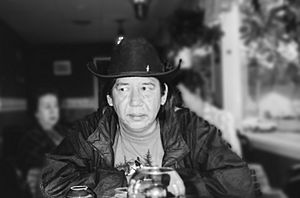Walter Bresette facts for kids
Walter Bresette (born July 4, 1947 – died February 21, 1999) was an important Ojibwe leader, activist, and writer. He was well-known for his work on protecting the environment and defending Ojibwe treaty rights in northern Wisconsin and around Lake Superior. He helped start several groups, including Witness for Nonviolence, the Midwest Treaty Network, and the Wisconsin Green Party.
Contents
Early Life and Background
Walter Bresette was born in 1947. He was a member of the Red Cliff Band of Lake Superior Chippewa tribe in Wisconsin and belonged to the Loon clan.
He served in the United States Army in Japan. After returning to Red Cliff, he ran a store that sold traditional goods. Walter was also a talented artist who created Ojibwe "moon cards" and other traditional art. He was a great storyteller and a respected elder in his community.
Standing Up for Fishing Rights
In 1988, a US court ruled that the Ojibwe people had the right to fish in their traditional ways, as part of their treaties. This included fishing for walleye during spawning season. In the years that followed, some sports fishermen protested, leading to conflicts known as the Wisconsin Walleye War.
Walter Bresette became a strong voice for Native American treaty rights. To help protect the Ojibwe spearfishers and record what was happening, he started a group called Witness for Nonviolence. This group organized people to observe and video-record events at boat landings where protests were taking place.
During this time, Walter also ran a store in Duluth, Minnesota. One day, federal agents seized some migratory bird feathers from his store. Walter and his associate, Esther Nahgahnub, argued they had the right to possess and sell these items because of treaty rights. A judge agreed and returned the feathers. This case, sometimes called "Feathergate," helped make Ojibwe rights clearer. Walter later wrote about these events in his book, Walleye Warriors: An Effective Alliance Against Racism and for the Earth (1993).
Fighting Against Mining
In the 1990s, Walter Bresette focused on stopping proposed sulfide mines in Northern Wisconsin. He was worried these mines would cause serious damage to the environment. In every mining battle, Walter spoke about treaty rights and the Ojibwe people's right to protect their lands and resources.
He co-founded a group called Anishinabe Niijii to oppose mining. He believed mining would destroy important watersheds, including those that feed into Lake Superior. The group tried to stop a sulfide mine near Ladysmith, Wisconsin, but it went ahead. During these protests, Walter used a war club that once belonged to the famous Sauk chief Black Hawk. This club was a gift to Walter for his important work.
His group did succeed in stopping the proposed Lynne mine in Oneida County. A major target of his protests was the planned Crandon mine in Forest County. This mine aimed to extract zinc sulfide, but Walter and others pointed out the danger to the Wolf River and the nearby Mole Lake Ojibwe reservation.
Walter also became involved with the White Pine mine in Michigan. This old copper mine planned to pour sulfuric acid into its shafts to get out more copper, without proper environmental checks. Walter resigned from an EPA position he held because of his concerns for Lake Superior. He became a spokesperson for Anishinabe Ogitchida, a group that protested by stopping tanker cars carrying sulfuric acid from crossing the Bad River Ojibwe reservation in Ashland County, Wisconsin. This event, known as the Bad River Train Blockade, brought a lot of media attention and eventually stopped the mine's plans.
Walter Bresette lived to see Wisconsin pass a law that paused the Crandon project. He passed away before two nearby tribes bought the mine in 2003 to protect it from future development.
Other Important Work
Walter Bresette was also very active in politics at local, state, and national levels. In the 1980s, he and his friend Frank Koehn started the Lake Superior Greens. This was one of the first green parties in the United States. In 1986, Frank Koehn won a seat on the Bayfield County board, becoming the first Green Party candidate to win an elected office in the US.
Walter and Frank were also key founders of the Wisconsin Green Party, which held its first meeting in 1988. In the 1990s, Walter promoted the Seventh Generation Amendment, also called the Common Property Amendment, to the US Constitution. This amendment aimed to protect resources for future generations. To promote this idea, Walter helped organize people to walk all the way around Lake Superior.
Walter Bresette continued to work on environmental issues, treaty rights, and human rights until he passed away from a heart attack in Duluth in 1999.
See also
- Crandon mine
- Bad River train blockade
- Red Cliff Band of Lake Superior Chippewa
- Frank Koehn
- Wisconsin Green Party
 | Jackie Robinson |
 | Jack Johnson |
 | Althea Gibson |
 | Arthur Ashe |
 | Muhammad Ali |


